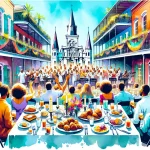Mardi Gras in New Orleans is a lively celebration deeply rooted in cultural traditions and joyous festivities. As the city transforms into a kaleidoscope of colors, music, and revelry, it’s crucial to grasp the laws that govern this iconic event. Navigating the intricate web of regulations ensures a safe and enjoyable experience for all attendees, preserving the spirit of Mardi Gras while maintaining order and respect for the community.
In This Article
TL;DR
- Alcohol consumption has designated areas, age restrictions, and open container regulations.
- Parade rules and safety measures aim to ensure public safety and orderly conduct.
- Non-compliance with Mardi Gras laws can lead to fines, citations, or arrests, highlighting the importance of adherence.
The Significance of Mardi Gras in New Orleans
Mardi Gras is more than just a celebration; it’s an integral part of New Orleans‘ cultural identity. Spanning centuries, this annual event has evolved into a global phenomenon, attracting millions of visitors to the city’s streets to revel in the infectious energy and vibrant traditions. From the elaborate costumes and masks to the colorful floats and thunderous marching bands, Mardi Gras embodies the essence of New Orleans’ unique character.
Legal Restrictions on Alcohol Consumption
While Mardi Gras is synonymous with indulgence and revelry, the city has implemented specific regulations to ensure responsible alcohol consumption during the festivities.
Zones of Alcohol Consumption
New Orleans designates certain areas where open containers and public alcohol consumption are permitted during Mardi Gras. These zones typically encompass the French Quarter, Bourbon Street, and other high-traffic areas along the parade routes. However, it’s crucial to respect the boundaries and refrain from carrying open containers outside these designated zones.
Age Restrictions and ID Requirements
The legal drinking age in Louisiana is 21, and this law remains in effect during Mardi Gras. Bars, restaurants, and vendors are required to verify the age of patrons by checking valid identification. Underage drinking is strictly prohibited and can result in fines or legal consequences.
Open Container Laws
While open containers are permitted in designated areas, there are specific regulations regarding the type of containers allowed. Glass containers are typically banned along parade routes and in crowded areas to prevent potential safety hazards. Revelers are encouraged to use plastic or aluminum containers to ensure compliance with these laws.
Parade Rules and Safety Regulations
Mardi Gras parades are the centerpiece of the celebrations, attracting thousands of spectators to the city’s streets. To ensure the safety of participants and attendees, the city has implemented a set of rules and regulations.
Route Regulations
Parade routes are carefully planned and monitored by local authorities. Spectators are required to remain behind designated barricades and follow instructions from law enforcement and parade officials. Interfering with the parade, such as attempting to join the procession or hanging onto floats, is strictly prohibited and can result in citations or arrests.
Safety Measures for Attendees
The city takes extensive measures to ensure the safety of parade attendees. These include the presence of law enforcement officers, barricades, and crowd control measures. Attendees are advised to remain vigilant, stay hydrated, and report any suspicious activities or emergencies to the appropriate authorities.
Prohibited Items
To maintain a safe environment, certain items are prohibited along parade routes. These may include weapons, glass containers, fireworks, and other potentially dangerous objects. Attendees are encouraged to familiarize themselves with the list of prohibited items and comply with these regulations to avoid confiscation or legal consequences.
Costume and Mask Laws
Mardi Gras is renowned for its elaborate costumes and masks, adding to the festive atmosphere and preserving the tradition of anonymity. However, there are specific laws governing the use of costumes and masks during the celebrations.
Costume Regulations
While costumes are encouraged and celebrated, there are certain restrictions in place. Costumes that obscure one’s identity or impede visibility may be subject to regulations, particularly in areas where security is a concern. Attendees are advised to ensure their costumes comply with any applicable laws or guidelines.
Decency Laws
New Orleans has decency laws in place that apply to costumes and attire during Mardi Gras. Public nudity and indecent exposure are prohibited, and costumes must adhere to these laws. Attendees are expected to dress appropriately and respect the family-friendly nature of many Mardi Gras events and parades.
Enforcement of Mardi Gras Laws
To ensure the smooth and safe operation of Mardi Gras celebrations, local law enforcement agencies play a crucial role in enforcing the established laws and regulations.
Role of Law Enforcement
The New Orleans Police Department (NOPD), in collaboration with state and federal agencies, is responsible for maintaining order and enforcing laws during Mardi Gras. Officers are present along parade routes, in high-traffic areas, and at various events to monitor compliance and address any violations or disturbances.
Penalties for Non-Compliance
Violations of Mardi Gras laws can result in various penalties, depending on the severity of the offense. These may include citations, fines, or even arrests in cases of more serious infractions. It’s essential for attendees to familiarize themselves with the laws and comply with them to avoid legal consequences that could disrupt their Mardi Gras experience.
Impact of Mardi Gras Laws on Local Businesses
Mardi Gras is not only a cultural celebration but also a significant economic driver for New Orleans. As such, local businesses must adapt to the laws and regulations governing the festivities.
Business Compliance
Businesses operating during Mardi Gras, such as bars, restaurants, and vendors, are required to obtain necessary permits and licenses. They must also adhere to regulations regarding alcohol service, crowd control, and public safety. Failure to comply with these laws can result in fines, license revocation, or temporary closures.
Economic Impact
While the laws and regulations surrounding Mardi Gras may seem restrictive, they play a crucial role in ensuring the long-term sustainability and economic viability of the event. By maintaining a safe and orderly environment, Mardi Gras continues to attract visitors from around the world, contributing significantly to the local economy and supporting businesses in the hospitality and tourism industries.
Public Behavior and Decency Laws
In addition to the specific laws governing Mardi Gras celebrations, attendees must also adhere to general public behavior and decency laws in New Orleans.
Public Intoxication Laws
While alcohol consumption is permitted in designated areas, public intoxication remains illegal in New Orleans. Attendees who exhibit signs of excessive intoxication or disorderly conduct may face citations or arrests by law enforcement officers.
Behavioral Expectations
Mardi Gras is a family-friendly event, and attendees are expected to conduct themselves in a respectful and responsible manner. Disruptive behavior, public disturbances, and acts of vandalism or property damage are prohibited and can result in legal consequences.
Historical Context and Evolution of Mardi Gras Laws
The laws governing Mardi Gras in New Orleans have evolved over time, reflecting the changing needs and priorities of the city and its residents.
Origins of Laws
Many of the current Mardi Gras laws have their roots in the early days of the celebration, when concerns over public safety and crowd control prompted the implementation of regulations. As the event grew in popularity, additional laws were introduced to address issues such as alcohol consumption, parade routes, and public behavior.
Changes Over Time
Over the years, Mardi Gras laws have undergone various revisions and amendments to adapt to modern times. Some laws have been relaxed, while others have been tightened to address emerging concerns or incidents. The city continuously evaluates and updates these laws to strike a balance between preserving the spirit of Mardi Gras and maintaining public order and safety.
Practical Tips for Mardi Gras Attendees
To ensure a safe and enjoyable Mardi Gras experience, attendees should take proactive steps to familiarize themselves with the laws and regulations in place.
Planning Ahead
Before attending Mardi Gras, it’s advisable to research the specific laws and regulations that will be in effect during your visit. This includes understanding the designated areas for alcohol consumption, parade routes, and any prohibited items or activities. Planning ahead can help you avoid unintentional violations and ensure a smooth and hassle-free experience.
Staying Informed
The city of New Orleans provides regular updates and information regarding Mardi Gras laws and guidelines through various channels, including official websites, social media, and local news outlets. Attendees are encouraged to stay informed about any changes or updates to ensure they remain compliant throughout the celebrations.
By understanding and adhering to the laws governing Mardi Gras in New Orleans, attendees can fully immerse themselves in the vibrant traditions and festivities while contributing to a safe and enjoyable experience for all. Respecting these regulations not only ensures a memorable celebration but also preserves the rich cultural heritage of this iconic event for generations to come.






